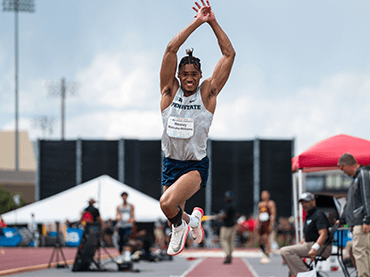Wes’ Story: Record-Breaking Triple Jumper Leaps Past Injuries
Ever since he was a boy, it was clear that Wesley Matsuka-Williams was fast. Growing up in Norwich, England, Wes’ dad recognized his son’s talent and signed him up for the local track team. There, moving up through the club sport system is key to being recognized by important figures in the track community. With dedicated training, that’s exactly what happened for Wes.
Climbing to the Top
Starting out in track, Wes often ran the 100-meter and 200-meter sprints, as well as competed in the long jump. He performed very well locally but hadn’t secured any national titles. He started to dabble in the standing triple jump and traditional triple jump (with an approach run), and at 13 years old entered into his first triple jump competition. He did so well, it was clear he should train only in that event.
Wes qualified for the national championships, placed third, and at 16 had incredible success in the triple jump – winning all major championships in England that year and qualifying for his first competition representing Great Britain on the national team.
At this point, he was the top triple jumper in England and in Europe for his birth year (2000) and was top ten in the world. He started to think of his future, ultimately deciding to study and compete in college in America at Pennsylvania State University.
Wes struggled with various injuries from 2016 through his freshman and sophomore years of college, and it came to a point where his knees were so painful, he feared he would no longer be able to compete or even have a decent quality of life if he continued. Then, he discovered UPMC.
Travelling to Pittsburgh
It started with a hip impingement diagnosis at Penn State and the recommendation of a cortisone injection into the hip. Wes wasn’t certain about getting the injection. A teammate mentioned he was going home to Pittsburgh for winter break and that Wes should see a professional that helped him a while back – Ron DeAngelo, MEd, LAT, FAFS, Director of Sports Performance, UPMC Sports Medicine.
Wes saw Ron and team at the UPMC Freddie Fu Sports Medicine Center in Pittsburgh’s South Side neighborhood. Ron tested his mobility, recognized tightness in several areas of his body in addition to the hips, and created a personalized pre-exercise routine with correctional movements and breathing that would help Wes recalibrate his posture and be more aware of his hip placement.
He helped with Wes’ mobility as a whole and set him up for success back home. “When I went to see Ron for my hip, I saw almost immediate improvement in my mobility and the pain I was experiencing,” Wes says. “I found that this team was quite good and knowledgeable, so I wanted to take the opportunity to care for my knees as well.” Ron referred Wes to the UPMC Department of Physical Medicine and Rehabilitation (PM&R).
Restoring Knees to Make the Jump
Soon after working with Ron, Wes saw a physiatrist at UPMC Passavant Spine Center in Wexford, Pa. and was diagnosed with patellar tendinopathy.
“By my doctor using the ultrasound, I learned about the problem areas in my knee and how I would be treated,” says Wes.
Wes underwent Percutaneous Ultrasonic Tenotomy (PUT) with the TENEX™ device, an approximately five-minute outpatient procedure that is performed with local anesthetics. It helps relieve chronic tendon pain by removing scarred and degenerated tendon or plantar fascia tissue.
Following the procedure, Wes modified his activity for two weeks and followed a rehabilitation plan developed by Lillie Silverstein, PT, DPT, CSCS, a former physical therapy resident who spoke with him weekly as he successfully navigated the plan from afar at Penn State. “UPMC was still very well connected throughout my rehab even though I wasn’t physically present,” Wes says. “Seeking the proper care was the differential factor in how my body responded. It was really refreshing to see a group of people who really cared for my health and wanted to see me improve. That even extended to my life outside of the clinic.”
Leaping to New Lengths
After treatment, he returned to compete collegiately and achieved his personal best, which had been on hold since coming to the States. He graduated from Penn State in May 2022 with undergraduate degrees in biomedical engineering and mechanical engineering, still with two years of potential NCAA eligibility.
Wes hopes to return to America for graduate school to complete an MBA and continue to compete. Now feeling much better physically than he has in quite some time, he once again believes going pro could be in the cards for him. He has his sights set on a hopeful professional career and representing his country again in international competition.
“I am overly satisfied with my care at UPMC,” Wes says. “I can’t describe how happy I am and how fortunate I feel to have been introduced to such incredible staff and knowledgeable people. They’ve helped me gain a better understanding of my own body and the nuances which lead to keeping me healthy. I want to make them proud and can’t thank them enough for reigniting the hope and keeping my dream alive.”

















